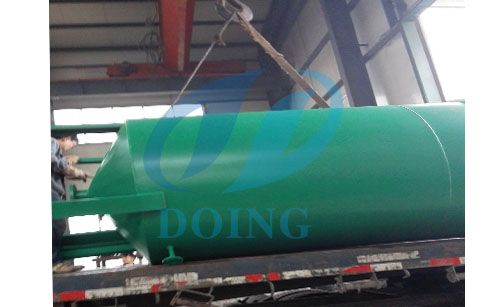Waste-to-energy plant opened at City waste management facility
Industry News / Date:January 24, 2018
Waste-to-energy plant opened at City waste management facility

Waste-to-energy plant
A new waste-to-energy plant at the City’s Kraaifontein Integrated Waste Management Facility (KIWMF) will see roughly 500 kg of plastic converted to 500 litres of oil per day.
The City of Cape Town, in partnership with the Japan International Cooperation Agency (JICA), today opened its plastics-to-oil conversion plant, kicking off a six-month pilot project that will provide invaluable insights into the potential for creating fuel from plastic waste diverted from landfill sites.
Today’s ribbon-cutting (and carbon-cutting) ceremony marked the culmination of more than a year’s worth of preparation and cooperation between the City, JICA and its Japanese partner corporations. This was made possible by the generous donation of US$1million from the Japanese Government and the pyrolysis plant technology developed and supplied by the CFP Corporation and Kanemiya Co., Ltd.
Japan is a world leader in waste minimisation and applying their technology in a South African context aligns with the City’s commitment to a future that is more energy secure, resource-efficient, and resilient to the impact of climate change.
By using the existing structures in the form of its Think Twice recycling collection initiative, the City, together with technical assistance from the Japanese engineers, built on available resources to support the functioning of the plant. After harvesting the three types of plastic (polyethylene, polypropylene and polystyrene) from the stream processed at the KIWMF, these materials (which come in the form of all manner of plastic packaging) are brought to the processing plant where they are then washed, shredded, heated and converted to oil.
The yield of 500 kg of plastic materials per day works out to approximately 500 litres of fuel. These yields will be assessed by specialised technicians on site to determine the quality and quantity of fuel being produced in different combinations and ratios of the three types of plastic. Ultimately, the aim is to test the best combinations to yield the highest quality.
Approximately 70% of fuel produced by the pilot plant will be channelled back into the running of the plant, powering the 150 kilowatt generator on site. The rest could be used to power any other machinery that runs on diesel if the oil is of a good quality.
‘The rising volumes of waste material produced in countries across the world represent a problem that cannot be ignored. They pose a threat to the health of the environment, and to the health of human beings. Sadly, we are united as a global community in this regard.
“The agreement signed between JICA, the CFP Corporation and the City of Cape Town in 2014 is an exciting step towards progress. Through partnership, we are able to explore possibilities and share ideas. We are not just united by the challenges we face, but are partners in finding the solutions,” said the City’s Mayoral Committee Member for Utility Services, Councillor Ernest Sonnenberg.
While the City of Cape Town is a leader in the country in terms of waste minimisation, there is still a long road ahead. The amount of waste plastic is increasing as one of the major waste materials in South Africa, at a rate of 6%. Meanwhile, the City’s recycling rate is still low, at 16%, and the bulk of the waste is sent to landfill sites.
“In terms of the National Waste Management Strategy of 2011, South Africa aims to achieve a recycling rate of 25% of the waste currently sent to landfill by the end of 2015. Considering this, we are naturally very keen to learn about new technologies that would help us to achieve that goal in a sustainable manner.”
“South Africa is the only G20 member in Africa and considered a newly industrialised country. The City of Cape Town recognises that cities are in a key position to steer a lower carbon, more resilient and sustainable future, and that this type of investment and research is key to joining the ranks of Japan in terms of waste, environment, and employment solutions,” added Councillor Sonnenberg.

Waste-to-energy plant
A new waste-to-energy plant at the City’s Kraaifontein Integrated Waste Management Facility (KIWMF) will see roughly 500 kg of plastic converted to 500 litres of oil per day.
The City of Cape Town, in partnership with the Japan International Cooperation Agency (JICA), today opened its plastics-to-oil conversion plant, kicking off a six-month pilot project that will provide invaluable insights into the potential for creating fuel from plastic waste diverted from landfill sites.
Today’s ribbon-cutting (and carbon-cutting) ceremony marked the culmination of more than a year’s worth of preparation and cooperation between the City, JICA and its Japanese partner corporations. This was made possible by the generous donation of US$1million from the Japanese Government and the pyrolysis plant technology developed and supplied by the CFP Corporation and Kanemiya Co., Ltd.
Japan is a world leader in waste minimisation and applying their technology in a South African context aligns with the City’s commitment to a future that is more energy secure, resource-efficient, and resilient to the impact of climate change.
By using the existing structures in the form of its Think Twice recycling collection initiative, the City, together with technical assistance from the Japanese engineers, built on available resources to support the functioning of the plant. After harvesting the three types of plastic (polyethylene, polypropylene and polystyrene) from the stream processed at the KIWMF, these materials (which come in the form of all manner of plastic packaging) are brought to the processing plant where they are then washed, shredded, heated and converted to oil.
The yield of 500 kg of plastic materials per day works out to approximately 500 litres of fuel. These yields will be assessed by specialised technicians on site to determine the quality and quantity of fuel being produced in different combinations and ratios of the three types of plastic. Ultimately, the aim is to test the best combinations to yield the highest quality.
Approximately 70% of fuel produced by the pilot plant will be channelled back into the running of the plant, powering the 150 kilowatt generator on site. The rest could be used to power any other machinery that runs on diesel if the oil is of a good quality.
‘The rising volumes of waste material produced in countries across the world represent a problem that cannot be ignored. They pose a threat to the health of the environment, and to the health of human beings. Sadly, we are united as a global community in this regard.
“The agreement signed between JICA, the CFP Corporation and the City of Cape Town in 2014 is an exciting step towards progress. Through partnership, we are able to explore possibilities and share ideas. We are not just united by the challenges we face, but are partners in finding the solutions,” said the City’s Mayoral Committee Member for Utility Services, Councillor Ernest Sonnenberg.
While the City of Cape Town is a leader in the country in terms of waste minimisation, there is still a long road ahead. The amount of waste plastic is increasing as one of the major waste materials in South Africa, at a rate of 6%. Meanwhile, the City’s recycling rate is still low, at 16%, and the bulk of the waste is sent to landfill sites.
“In terms of the National Waste Management Strategy of 2011, South Africa aims to achieve a recycling rate of 25% of the waste currently sent to landfill by the end of 2015. Considering this, we are naturally very keen to learn about new technologies that would help us to achieve that goal in a sustainable manner.”
“South Africa is the only G20 member in Africa and considered a newly industrialised country. The City of Cape Town recognises that cities are in a key position to steer a lower carbon, more resilient and sustainable future, and that this type of investment and research is key to joining the ranks of Japan in terms of waste, environment, and employment solutions,” added Councillor Sonnenberg.
Request Information
Send your inquiry for further information





